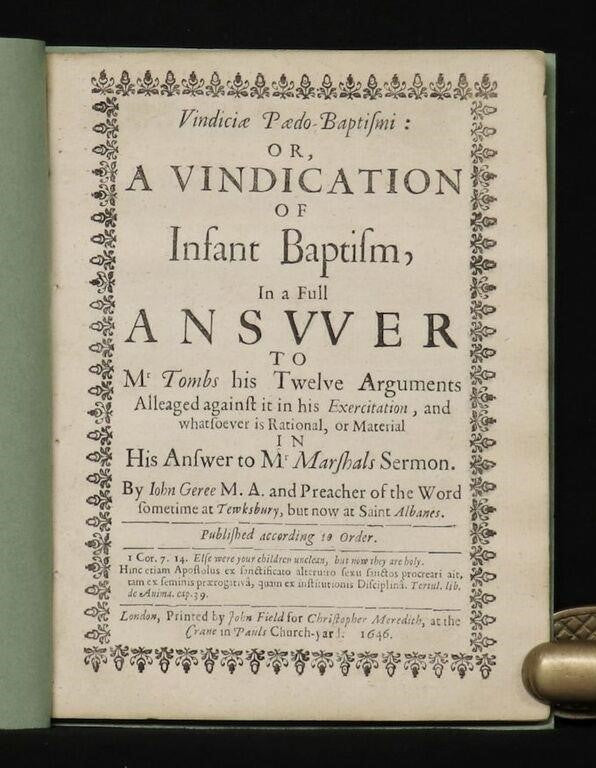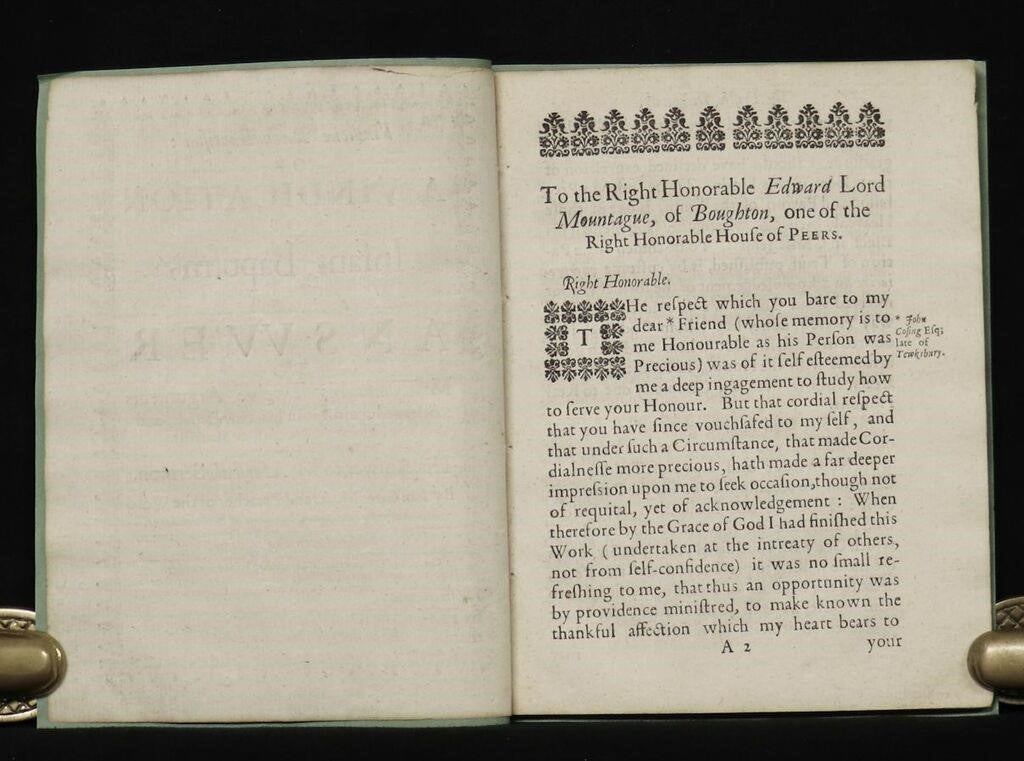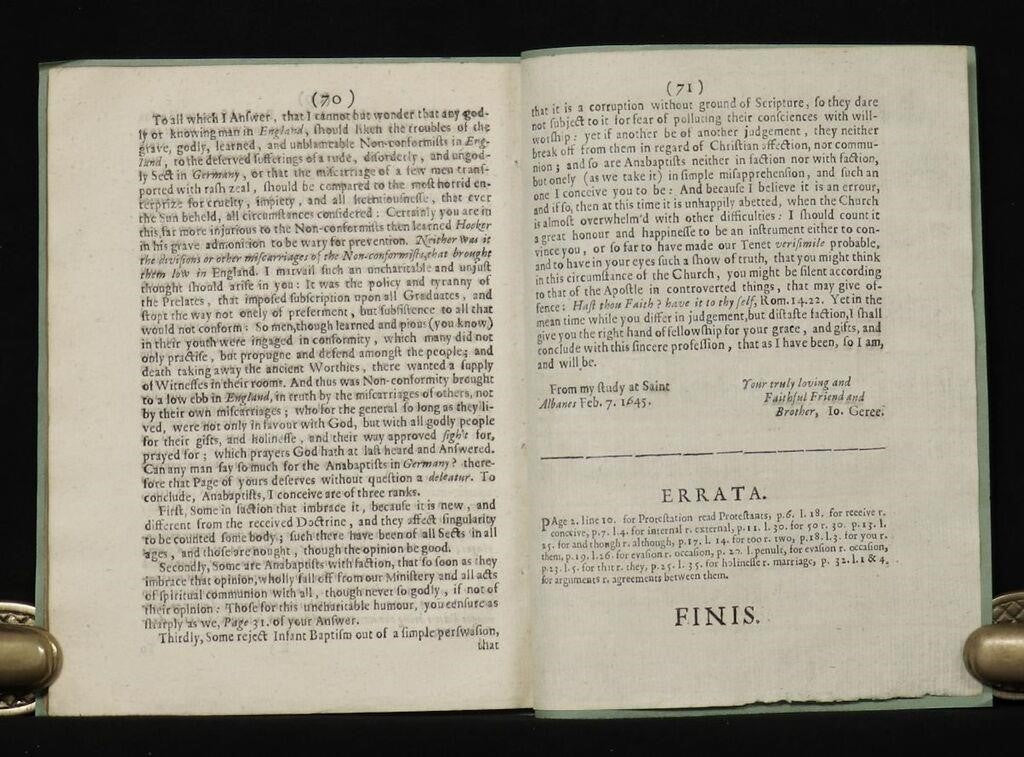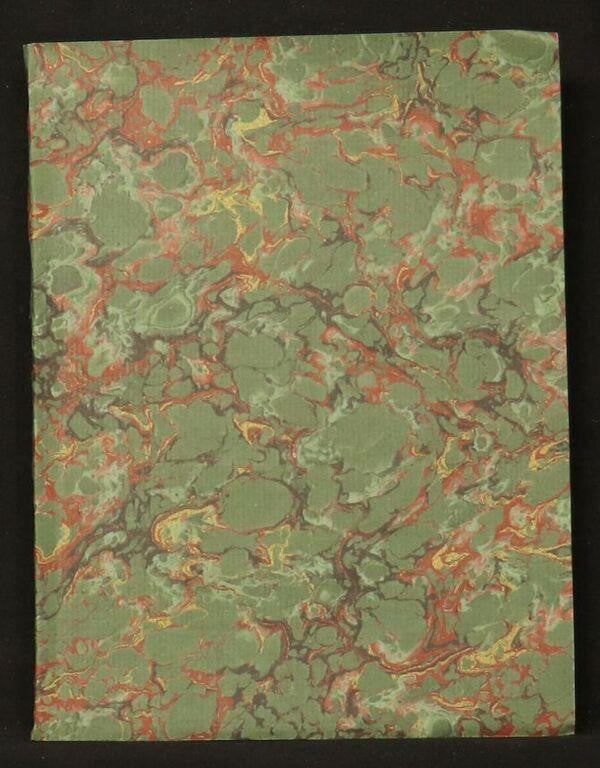Specs Fine Books
1647 JOHN GEREE. Exceptionally Rare Work Against Baptists by Friend of John Tombes.
1647 JOHN GEREE. Exceptionally Rare Work Against Baptists by Friend of John Tombes.
Couldn't load pickup availability
Puritan, John Geree [1600-1649], was one of the most significant 17th century theologians to interact with the emerging Baptist theology of the day. His concerns were both personal, since he had been dear friends with later Baptist, John Tombes in college [see here], and pastoral, since his region of England was perhaps the most dynamic in terms of Baptist influence.
Geree’s two works on the baptism are scarce, critical to study of the development of early Baptist theology and history, and very desirable. This, and the other we have listed concurrently, are the only two we have ever seen offered on the open market. This is the first edition of the first response to Tombes on Baptism.
Geree, John. Vindiciae Paedo-Baptismi; Or, A Vindication of Infant Baptism, in a Full Answer to Mr. Tombs, etc. London: by John Field for Christopher Meredith, 1646. 8 + 71pp.
John Geree and his brother Stephen, also a noted Puritan divine, were born in Yorkshire, and studied at Magdalen College. Stephen became a student there in 1611, aged 17, and went through the courses in Logic and Philosophy, taking B.A. in 1615. He was ordained in 1615. John entered the college in 1615, aged 14. He graduated B.A. on 27 January 1619, and took his M.A. on June 12, 1621, the same day on which John Tombes took his B.A. from the same college.
John Geree made an early appearance in print in 1625, with a dedicatory epistle to the collected lectures of William Pemble, published after his death as Vindiciae Fidei: A Treatise of Justification by Faith. He was just 24. In November 1627 he was licensed as a preacher throughout London, Gloucester and Worcester, and as preacher and curate in Tewkesbury, Gloucestershire. In 1629 he published at Oxford A Catechisme concerning the Lord's Supper. For refusal to conform to ceremonies of the Church of England he was silenced by Godfrey Goodman, Bishop of Gloucester and was reduced to living by the financial support of his fellow Puritans. He did however, continue to defy his suspension and by 1641 had a large informal congregation in the region.
In 1641 he was restored to his charge by the Committee for Plundered Ministers. He immediately began publishing again. First, The Down-Fall of Anti-Christ, dedicated to the Committee itself, and Judah's Joy at the Oath, a sermon celebrating the Parliamentary Covenant, but finding unsoundness in Henry Burton’s radical interpretation of it. In the following year he preached by authority at a public fast on behalf of Ireland (a sermon printed in Dublin and London), and in 1644 published Vindiciæ Ecclesiæ Anglicanæ, a treatise showing the need for reform and the ejection of scandalous ministers.
At this time, his interaction with his old friend Tombes, and the Baptist movement then exploding in Hertfordshire, began in earnest. His first work, Vindiciae Paedo-Baptismi and Vindiciae Vindiciarum, offered here, and its successor, were directed against the arguments of his former fellow-student John Tombes, whom he addresses in the text as, “his 'ancient friend.'” He also addresses Edward Harrison, founder of the St Albans Baptists. Their belief was that the sacrament of baptism should be accorded only to those of age and understanding to be able to confess their faith. Having personally been persecuted for conscience’s sake, it is warming to see him deal as fairly as possible with Tombes, avoiding linguistic violence and unscrupulous mischaracterizations, which were quite common for those writing against the Baptists.
By this time, he was widely recognized among Puritan circles as a theologian and preacher of no small talent. He was appointed preacher at St. Faith under St. Paul’s. The church was full of local academics, booksellers, and he was frequented by many other Puritans who wished to attend his sermons. While here, he edited the works of William Fenner and introduced the publication of a tract from Thomas Shepard.
A person of deep personal conviction, his sermons which often touched on pertinent issues of the moment drew him into repeated controversy. He preached, On the Bloodiness of War, to persuade to peace, which was taken as an aspersion upon the army. He published it with notes in self-defense. He was, at the very heart, a man of peace. As a result, he came into controversy with John Goodwin, arguing that the seclusion and imprisoning of certain Parliament-men by the Cromwellian army was defensible neither by reason nor religion. The violence of the Church in his age nearly broke his heart, and some believe was the cause of his death. His advocacy of reform had steered a careful path away from rebellion: he died in February 1649, soon after the King's execution. It was reported by Richard Baxter that Geree was against the Parliament's war, and that “he dyed at the news of the King's death.”
Puritan, John Geree [1600-1649], was one of the most significant 17th century theologians to interact with the emerging Baptist theology of the day. His concerns were both personal, since he had mentored John Tombes, and pastoral, since his region of England was perhaps the most dynamic in terms of Baptist influence.
His works on the subject are scarce, critical to study of the development of early Baptist theology and history, and very desirable. This, and the other we have listed concurrently, are the only two we have ever seen offered on the open market.
John Geree and his brother Stephen, also a noted Puritan divine, were born in Yorkshire, and studied at Magdalen College. Stephen became a student there in 1611, aged 17, and went through the courses in Logic and Philosophy, taking B.A. in 1615. He was ordained in 1615. John entered the college in 1615, aged 14. He graduated B.A. on 27 January 1619, and took his M.A. on June 12, 1621, the same day on which John Tombes took his B.A. from the same college.
John Geree made an early appearance in print in 1625, with a dedicatory epistle to the collected lectures of William Pemble, published after his death as Vindiciae Fidei: A Treatise of Justification by Faith. He was just 24. In November 1627 he was licensed as a preacher throughout London, Gloucester and Worcester, and as preacher and curate in Tewkesbury, Gloucestershire. In 1629 he published at Oxford A Catechisme concerning the Lord's Supper. For refusal to conform to ceremonies of the Church of England he was silenced by Godfrey Goodman, Bishop of Gloucester and was reduced to living by the financial support of his fellow Puritans. He did however, continue to defy his suspension and by 1641 had a large informal congregation in the region.
In 1641 he was restored to his charge by the Committee for Plundered Ministers. He immediately began publishing again. First, The Down-Fall of Anti-Christ, dedicated to the Committee itself, and Judah's Joy at the Oath, a sermon celebrating the Parliamentary Covenant, but finding unsoundness in Henry Burton’s radical interpretation of it. In the following year he preached by authority at a public fast on behalf of Ireland (a sermon printed in Dublin and London), and in 1644 published Vindiciæ Ecclesiæ Anglicanæ, a treatise showing the need for reform and the ejection of scandalous ministers.
At this time, his interaction with his old friend Tombes, and the Baptist movement then exploding in Hertfordshire, began in earnest. His first work, Vindiciae Paedo-Baptismi and Vindiciae Vindiciarum, offered here, was directed against the arguments of his former fellow-student John Tombes, whom he addresses in the text as, “his 'ancient friend.'” He also addresses Edward Harrison, founder of the St Albans Baptists. Their belief was that the sacrament of baptism should be accorded only to those of age and understanding to be able to confess their faith. Having personally been persecuted for conscience sake, it is warming to see him deal as fairly as possible with Tombes, avoiding linguistic violence and unscrupulous mischaracterizations, which were quite common for those writing against the Baptists.
By this time, he was widely recognized among Puritan circles as a theologian and preacher of no small talent. He was appointed preacher at St. Faith under St. Paul’s. The church was full of local academics, booksellers, and he was frequented by many other Puritans who wished to attend his sermons. While here, he edited the works of William Fenner and introduced the publication of a tract from Thomas Shepard.
A person of deep personal conviction, his sermons which often touched on pertinent issues of the moment drew him into repeated controversy. He preached, On the Bloodiness of War, to persuade to peace, which was taken as an aspersion upon the army. He published it with notes in self-defense. He was, at the very heart, a man of peace. As a result, he came into controversy with John Goodwin, arguing that the seclusion and imprisoning of certain Parliament-men by the Cromwellian army was defensible neither by reason nor religion. The violence of the Church in his age nearly broke his heart, and some believe was the cause of his death. His advocacy of reform had steered a careful path away from rebellion: he died in February 1649, soon after the King's execution. It was reported by Richard Baxter that Geree was against the Parliament's war, and that “he dyed at the news of the King's death.”
Condition is very good; a nice, clean example in modern marbled wraps, one leaf with small early ink note to margin. Exceptionally scarce.
Share










